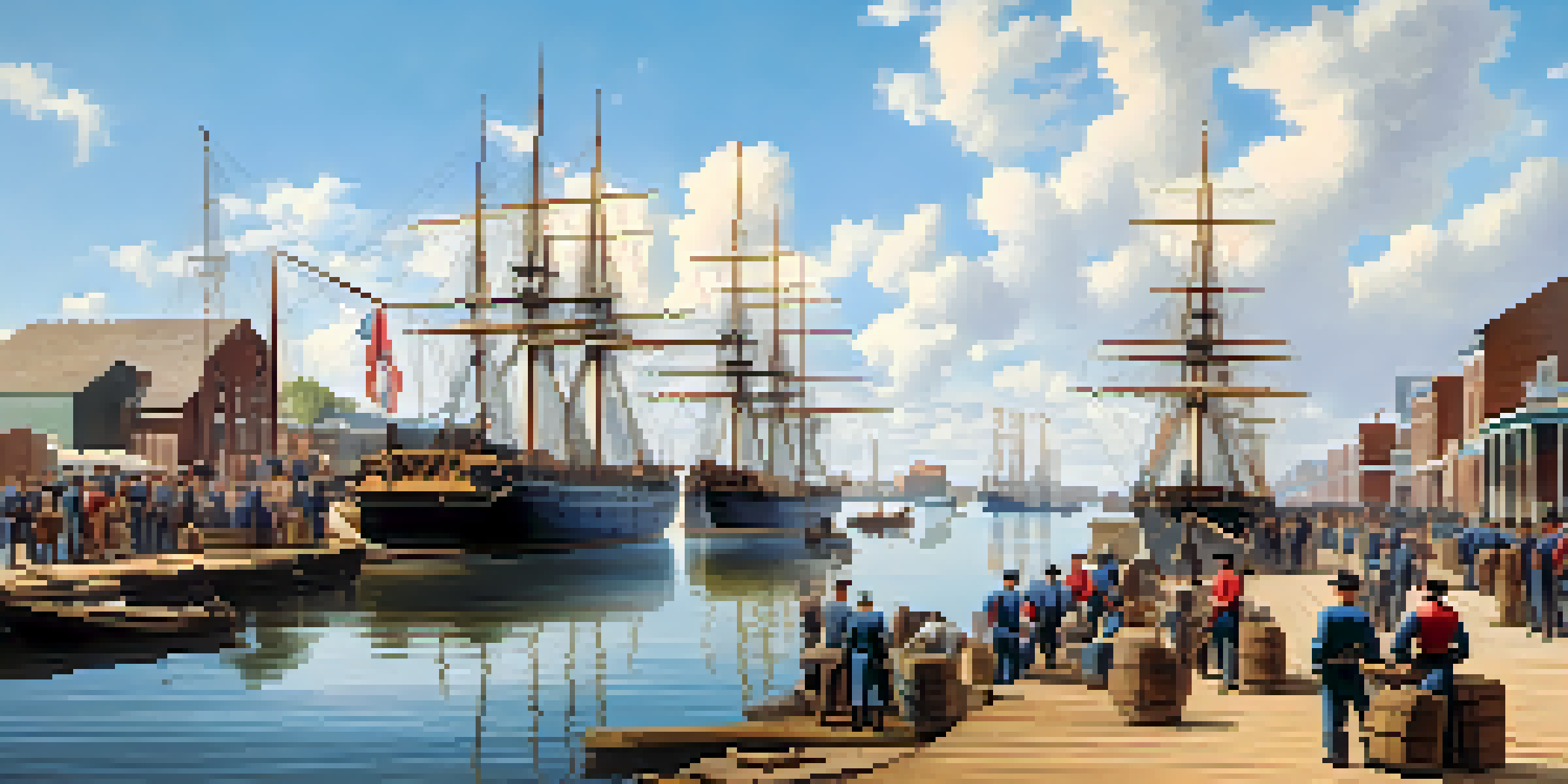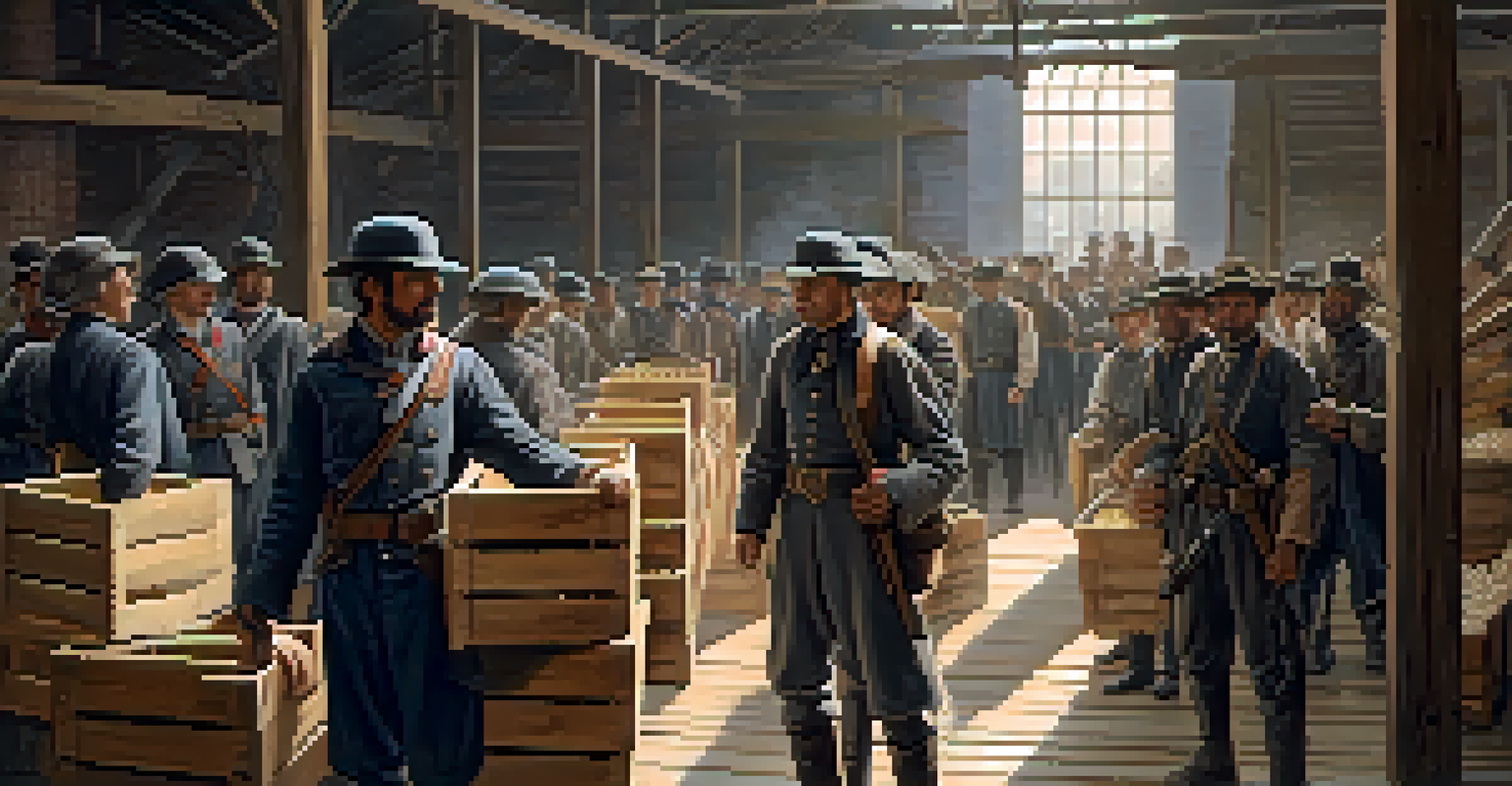Savannah's Role in Supplying Confederate Forces

Introduction to Savannah's Strategic Importance
During the Civil War, Savannah, Georgia, emerged as a key player in the Confederate supply chain. Its strategic location along the Atlantic coast made it a prime port for shipping essential goods. This accessibility allowed Confederate forces to receive much-needed supplies, including arms, ammunition, and food.
The art of war is to seize the moment and create your own opportunities.
Savannah's position also provided a natural advantage for defense, as its waterways made it difficult for Union forces to mount an effective blockade. The city's geography not only facilitated trade but also helped protect Confederate interests from Northern advances. This unique combination of factors solidified Savannah's role as a logistical hub during the war.
As the conflict escalated, the importance of Savannah only grew. It became a bustling center for military activity, with warehouses filled to the brim with supplies destined for the Confederate troops on the front lines.
Key Supplies Shipped Through Savannah
The supplies flowing through Savannah were varied and critical to the Confederate war effort. The city was a major exporter of cotton, which was not only valuable for the Southern economy but also used as a bargaining chip in international trade. Cotton shipments helped secure much-needed supplies from foreign nations, particularly Britain and France.

In addition to cotton, Savannah served as a distribution point for weaponry and munitions. Factories in the region produced rifles, cannons, and ammunition that were vital to sustaining the Confederate army. These supplies played a crucial role in enabling Southern troops to engage in battles across the theater.
Savannah: Key Confederate Supply Hub
Savannah's strategic location and infrastructure played a crucial role in supporting the Confederate supply chain during the Civil War.
Moreover, food supplies were essential for maintaining troop morale and health. Savannah's agricultural hinterlands provided a steady stream of provisions, including meat, corn, and other staples, which were crucial for the sustenance of soldiers enduring the hardships of war.
The Infrastructure Supporting Supply Chains
Savannah's infrastructure was pivotal in supporting the movement of supplies. The city boasted a network of railroads that connected it to other Southern cities, facilitating rapid transport of goods. This rail connectivity allowed supplies to reach the front lines quickly, which was essential for military success.
In war, the moral is to the physical as three is to one.
Additionally, the port of Savannah was equipped to handle large vessels, allowing for efficient loading and unloading of cargo. The docks bustled with activity as ships arrived and departed, laden with crucial supplies for the Confederate forces. This maritime capability solidified Savannah’s reputation as a key logistical hub.
The combination of rail and maritime transport ensured that Savannah could respond effectively to the urgent needs of the Confederate army, making it an indispensable asset in the South’s war strategy.
The Impact of Blockades on Supply Routes
As the war progressed, Union blockades began to take their toll on Savannah’s supply routes. The Anaconda Plan aimed to suffocate the Confederacy economically by blockading Southern ports, which threatened Savannah’s ability to function as a supply hub. This shift forced the Confederacy to become increasingly resourceful in finding alternative supply lines.
Despite the challenges posed by the blockades, Savannah's strategic significance remained. The city’s defenders made concerted efforts to protect supply routes from Union ships, even resorting to innovative tactics to evade detection and maintain shipments. This resilience highlighted Savannah’s importance as a supply center.
Impact of Blockades on Supplies
Union blockades significantly challenged Savannah's ability to function as a supply center, forcing the Confederacy to adapt its strategies.
The ongoing struggle to maintain supply lines underscored the broader challenges faced by the Confederacy. While Savannah continued to supply its forces, the effectiveness of these efforts fluctuated with the Union's naval capabilities and strategies.
Savannah's Role in Confederate Morale
The supplies flowing through Savannah had a profound impact on the morale of Confederate troops. Regular shipments of food and equipment helped sustain soldiers’ spirits, giving them the confidence needed to continue fighting. Knowing that supplies were coming in from Savannah provided a sense of reassurance during challenging times.
Moreover, the city served as a symbol of Southern resilience. Even as Union forces advanced, the ability to maintain supply lines through Savannah illustrated the South’s determination to sustain its fight. This psychological boost was crucial for troop motivation.
As battles raged on, the supplies from Savannah were not just material goods; they represented hope and the struggle for independence. The city became a beacon of Southern pride, reinforcing the commitment of soldiers to their cause.
The Fall of Savannah and Its Consequences
In December 1864, Savannah fell to Union General William Tecumseh Sherman during his infamous March to the Sea. This loss marked a pivotal moment in the Civil War, as it cut off a crucial supply line for the Confederacy. The capture of Savannah dealt a significant blow to Southern war efforts and morale.
The fall of Savannah had immediate repercussions for the Confederate army. With one of its most vital supply hubs lost, troops faced increasing shortages of food, arms, and other essential supplies. This scarcity hampered their ability to fight effectively in subsequent battles.
Fall of Savannah's Consequences
The capture of Savannah in 1864 marked a pivotal blow to the Confederacy, disrupting vital supply lines and impacting troop morale.
Furthermore, the loss highlighted the effectiveness of the Union's blockade strategy. As more Southern cities fell, the Confederacy struggled to maintain its supply chains, ultimately contributing to its downfall in the war.
Legacy of Savannah's Role in the Civil War
Today, Savannah’s historical significance is recognized and celebrated. The city’s role as a critical supply hub during the Civil War is an integral part of its heritage. Various museums and historical sites commemorate the contributions of Savannah to the Confederate cause.
Moreover, the lessons learned from Savannah's experience during the war continue to resonate. The importance of logistics and supply chains in military strategy is a topic of study for historians and military professionals alike. Savannah’s legacy serves as a reminder of how critical infrastructure can influence the outcomes of conflict.

As visitors explore Savannah today, they encounter a city that has evolved from its past but still acknowledges its history. The story of Savannah as a supply center reminds us of the complexities of war and the lasting impact it has on communities.